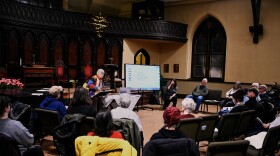Naugatuck is set to become the first community in the state to be able to develop housing with the Connecticut Municipal Development Authority (CMDA).
The authority is an opt-in, quasi-public agency with the goal of helping communities add more housing and mixed-use developments near downtown areas and train or bus stations.
The agency was founded in 2019, but it wasn’t fully funded and operational until last year.
Naugatuck was the first municipality to express interest in joining the authority, according to the authority’s director David Kooris.
Kooris said he’s already been in conversation with developers on projects that will add housing to downtown areas.
“They're not going to be, necessarily, the same density that's allowed in Waterbury or New Haven, but density that is appropriate for Naugatuck,” Kooris said.
Following a meeting next week, developers will be able to propose projects surrounding Naugatuck’s train station to the CMDAfor funding.
The CMDA will also help communities change their zoning restrictions to increase housing, while staying true to the region’s goals.
“We're in the process of clearing and remediating,” Kooris said. “Some of these zones don't allow residential, or some of these zones only allow lower density or single family residential, and then other zones allow, or even encourage mixed use and multi-family and medium and higher density development.”
More than two dozen communities have opted into CMDA, and about five are expected to be approved later this month. However, the remaining communities have been tightlipped. They have not been named or shared their development plans.
Naugatuck is the first municipality that'll finalize their involvement with CMDA and be able to receive project funding.
As the authority is opt-in, towns must express interest in joining CMDA and conduct meetings with the local governing body and the public. CMDA locates areas of the town that would be ripe for housing development and helps guide zoning changes that can be made to make projects more feasible.
CMDA zoning recommendations don't usurp local zoning laws, Kooris said.
“We can make recommendations, and those recommendations may be a condition upon which we would require in order to move to the next step in the process, but it's still within the purview of local zoning,” Kooris said.
Developers will be able to apply directly to the authority for funding and guidance. The authority has $90 million in bonding to use through the next fiscal year, $60 million of which is currently available and an additional $30 million coming next year, Kooris said.
The authority will fund projects in loans, with loan payments going back into the system to fund future loans.
Naugatuck town has a lofty goal in working with the authority, according to Naugatuck Mayor Pete Hess.
“We want to have the best transit oriented development district in the United States of America,” Hess said.
There is a multi-phased housing development already under construction near Naugatuck’s train station, but CMDA will be able to provide loans for upcoming phases, Hess said.
“We're building a new train station, new train platform, and 180 affordable housing units surrounding the train station,” Hess said. “We're also doing a market rate project of 250 units right in our downtown, and we are perfectly suited to participate in the program to help us finish the project.”





